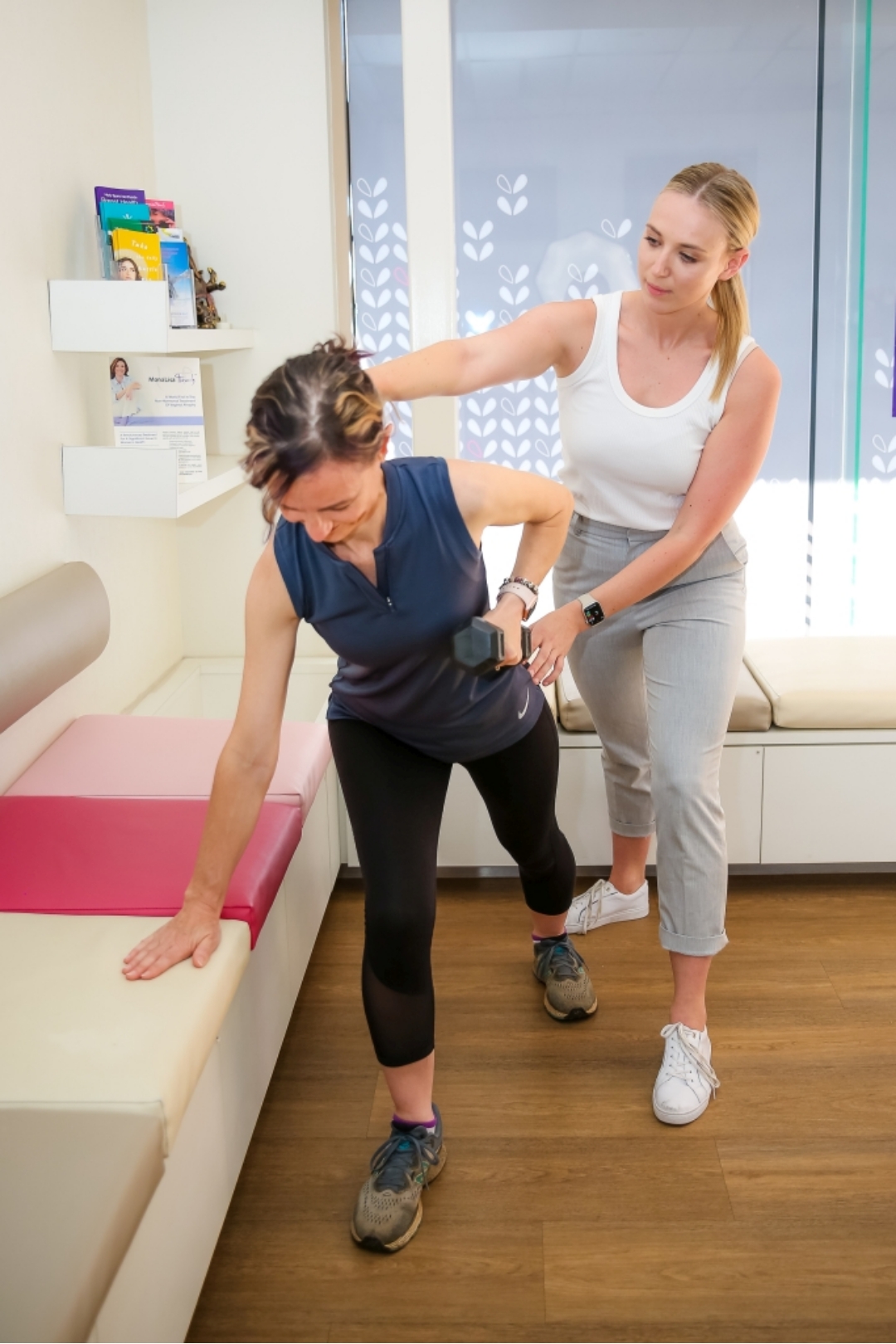Our passionate and experienced Specialist Exercise Physiologist and Pelvic Floor Physiotherapist, Nicole Saxby, provides tailored care for female wellness. With a double degree in clinical exercise physiology and physiotherapy, Nicole has an exceptional and rare combination of expertise, offering comprehensive care that addresses women's health in an extraordinary way. Learn more about Nicole Saxby and her practice below.
What sparked your passion for women’s health?
It was a combination of personal experience and a desire to help other women.
I have always been interested in health and fitness, but it wasn’t until I experienced some health issues of my own that I fully realised the importance of taking care of my body. Drawing from my experiences as a member of the Australian Ballet School, I realised that the extensive and comprehensive ballet training from an early age made me acutely aware of human physiology and the benefits of exercise rehabilitation. As I began to learn more about exercise physiology and physiotherapy, and how it can be used to improve women’s health, I became passionate about sharing this knowledge with others.

One of the things that I love most about working in women’s health is the opportunity to help women achieve their goals and improve their quality of life. Whether it’s helping a woman recover from an injury or illness, or simply helping her feel more confident and comfortable in her own skin, there is nothing more rewarding than seeing the positive impact of exercise in a woman’s life.
Common women’s health conditions or concerns addressed through exercise physiology
As an exercise physiologist and physiotherapist who specialises in women’s health, I address a wide range of conditions and concerns specific to women.
In terms of exercise physiology, some of the most common conditions that I work with include:
- Menopause-related issues, such as osteoporosis and weight gain
- Pelvic floor dysfunction
- Breast and gynaecological cancer recovery
- Polycystic ovary syndrome (PCOS)
- Pain management for endometriosis/pelvic pain disorders
In addition, I also work with women who are looking to improve their overall health and fitness. This can include weight loss, strength training, improving flexibility/balance, and rehabilitating musculoskeletal injuries.
Common women’s health conditions or concerns addressed through pelvic floor physiotherapy
In terms of pelvic floor physiotherapy, this service offers benefits to everyone, especially those experiencing pelvic floor dysfunction, regardless of the severity or duration of the condition. Common issues I address include:
- Bladder and bowel concerns.
- Pelvic organ prolapse.
- Pelvic pain.
- Sexual dysfunction.
- Antenatal and postnatal care
- Rehabilitation before and after gynaecological and colorectal surgeries.
Many individuals suffer silently, but the good news is that most pelvic health conditions can be prevented, cured, or better managed with the right help, even though discussing bladder, bowel, and sexual health can be challenging.
How can women know if they should visit an exercise physiologist?
There are many reasons why women might want to see an exercise physiologist. Here are some of the most common:
- To improve their overall health and fitness: Exercise physiologists can help women create personalised exercise programs that meet their individual needs and goals. Exercise physiologists can also provide guidance on how to safely and effectively incorporate exercise into one’s daily life.
- To manage a chronic health condition: Exercise can help manage various chronic health conditions, such as heart disease, diabetes, and obesity. Exercise physiologists can collaboratively develop exercise programs tailored to specific conditions.
- To recover or rehabilitate from an injury or surgery: Exercise physiologists can help women safely and effectively recover from injuries. They can provide guidance on how to modify exercises, gradually increase activity levels, prevent re-injury, and regain strength and fitness.
- To improve their mental health: Exercise has been shown to effectively improve mental health, reducing stress, anxiety, and depression. Exercise physiologists can help women develop exercise programs that foster improved mental health.
Exercise physiology is also associated with the following benefits, and these may prompt a woman to engage with services:
- Increased bone density
- Decreased development of osteoporosis
- Reduced menopausal symptoms (such as hot flushes) through fitness
- Fall prevention
How do you assess and evaluate the unique needs and goals of women when developing exercise programs?
As a women’s health exercise physiologist and physiotherapist, I consider the following:
- Physical health: Women’s physical health needs can vary depending on age, activity level, and any underlying medical conditions. For example, a woman who has osteoporosis and knee pain will require a slightly different exercise program than a woman who has osteoporosis and pelvic organ prolapse.
- Mental health: Research shows that exercise is beneficial for mental health. Women may have different mental health needs depending on their personal experiences and circumstances.
- Lifestyle: Women’s lifestyles can vary greatly, depending on their work, family, and other commitments. This can impact how much time they have available for exercise, as well as the type of exercise most realistic for them.
- Personal preferences: Finally, it is important to consider a woman’s personal preferences when developing exercise programs. Some women prefer group exercise classes, while others prefer to exercise on their own. Some women enjoy high-intensity workouts, while others prefer more moderate-intensity activities.
Once I have assessed these factors, I can develop an exercise program tailored to the individual woman’s needs and goals. Exercise plans may involve a combination of different types of exercise, as well as specific modifications to accommodate any underlying medical conditions or personal preferences.
Here are some additional considerations that I take into account when developing exercise physiology programs for women:
- Menstrual cycle: A woman’s energy levels and physical capabilities can fluctuate throughout her menstrual cycle. This is something I keep in mind when planning exercise programs.
- Pregnancy and postpartum: Women’s bodies undergo many changes during pregnancy and postpartum. It is important to adjust exercise programs accordingly to avoid injury.
- Menopause: Menopause can also cause changes in women’s bodies, often affecting energy levels, physical capabilities, and risk of injury.

How do you empower women to take an active role in their own health and fitness journey?
- I create a space where women are free to ask questions, share their concerns, and express their goals.
- Women may have different levels of experience with exercise, and they may have different needs and goals. I listen and collaborate with each woman I work with to develop an exercise program that is right for her.
- I emphasise the importance of self-care and encourage women to listen to their bodies and take breaks when they need them. I also help women to set realistic goals and celebrate small wins along the way.
- I provide women with education and resources about health and fitness. This may include online tools, including smartphone apps that help track progress and adherence.
With a dedication to compassionate and evidence-based exercise, I help women take an active role in their health and fitness journey, empowering them to set goals and make progress.
At an exercise physiology session, Nicole will step you through appropriate, tailored exercises, and will provide a unique exercise program for you to regularly complete at home. Compassionate, individualised services are provided at pelvic floor physiotherapy appointments.
As of the 19th of September 2023, Nicole offers exercise and pelvic floor services at our North Lakes location, and you can make an appointment today!